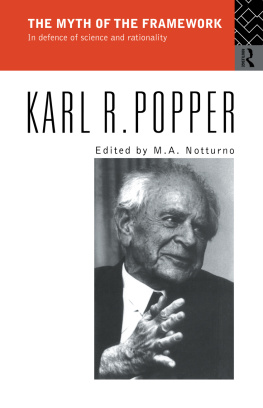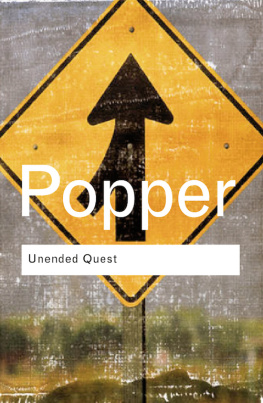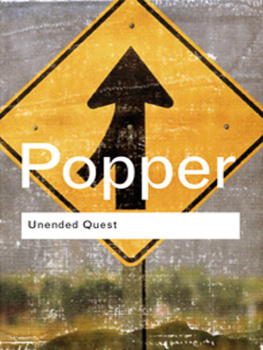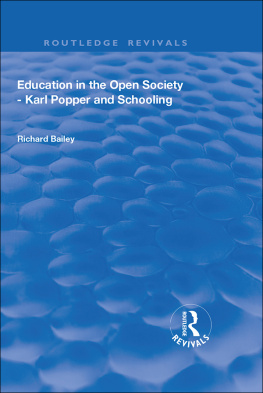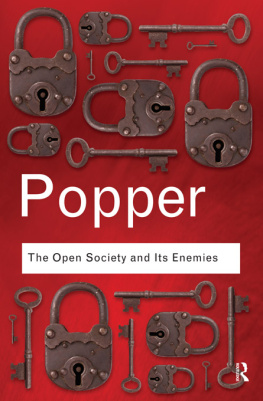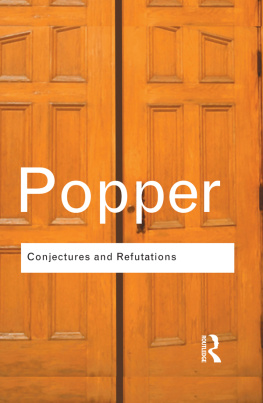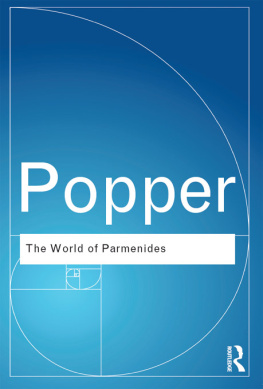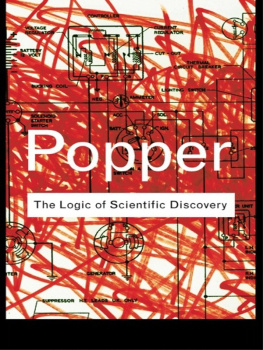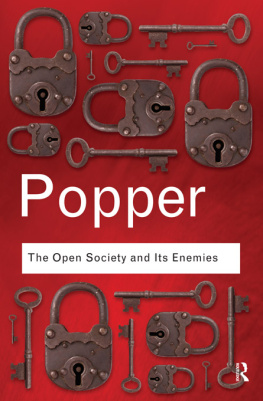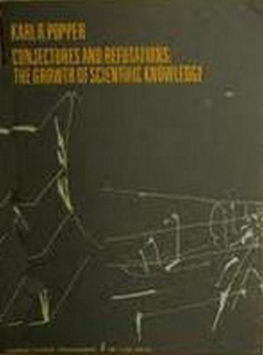Popper Karl - Conjectures and Refutations
Here you can read online Popper Karl - Conjectures and Refutations full text of the book (entire story) in english for free. Download pdf and epub, get meaning, cover and reviews about this ebook. year: 2018, publisher: Taylor and Francis, genre: Religion. Description of the work, (preface) as well as reviews are available. Best literature library LitArk.com created for fans of good reading and offers a wide selection of genres:
Romance novel
Science fiction
Adventure
Detective
Science
History
Home and family
Prose
Art
Politics
Computer
Non-fiction
Religion
Business
Children
Humor
Choose a favorite category and find really read worthwhile books. Enjoy immersion in the world of imagination, feel the emotions of the characters or learn something new for yourself, make an fascinating discovery.
- Book:Conjectures and Refutations
- Author:
- Publisher:Taylor and Francis
- Genre:
- Year:2018
- Rating:5 / 5
- Favourites:Add to favourites
- Your mark:
- 100
- 1
- 2
- 3
- 4
- 5
Conjectures and Refutations: summary, description and annotation
We offer to read an annotation, description, summary or preface (depends on what the author of the book "Conjectures and Refutations" wrote himself). If you haven't found the necessary information about the book — write in the comments, we will try to find it.
Conjectures and Refutations — read online for free the complete book (whole text) full work
Below is the text of the book, divided by pages. System saving the place of the last page read, allows you to conveniently read the book "Conjectures and Refutations" online for free, without having to search again every time where you left off. Put a bookmark, and you can go to the page where you finished reading at any time.
Font size:
Interval:
Bookmark:
The place and date of the first publication of the papers here collected are mentioned in each case at the bottom of the first page of each chapter. I wish to thank the editors of the various periodicals for giving me permission to include these papers in the present book.
I have been helped in various ways with the revision of the text, the reading of the proofs, and the preparation of the index, by Richard Gombrich, Lan Freed and Dr. Julius Freed, J. W. N. Watkins, Dr. William W. Bartley, Dr. Ian Jarvie, Bryan Magee, and A. E. Musgrave. I am greatly indebted to all of them for their help. My greatest indebtedness is to my wife. She has worked on the book even harder than I, and her acute criticism has led to innumerable improvements.
K. R. P.
It follows, therefore, that truth manifests itself
BENEDICTUS DE SPINOZA
Every man carries about him a touchstone to distinguish truth from appearances.
JOHN LOCKE
it is impossible for us to think of any thing, which we have not antecedently felt , either by our external or internal senses.
DAVID HUME
The title of this lecture is likely, I fear, to offend some critical ears. For although Sources of Knowledge is in order, and Sources of Error would have been in order too, the phrase Sources of Ignorance is another matter. Ignorance is something negative: it is the absence of knowledge. But how on earth can the absence of anything have This question was put to me by a friend when I confided to him the title I had chosen for this lecture. Hard pressed for a reply I found myself improvising a rationalization, and explaining to my friend that the curious linguistic effect of the title was actually intended. I told him that I hoped to direct attention, through the phrasing of this title, to a number of unrecorded philosophical doctrines and among them (apart from the doctrine that truth is manifest ) especially to the conspiracy theory of ignorance which interprets ignorance not as a mere lack of knowledge but as the work of some sinister power, the source of impure and evil influences which pervert and poison our minds and instil in us the habit of resistance to knowledge.
I am not quite sure whether this explanation allayed my friends misgivings, but it did silence him. Your case is different since you are silenced by the rules of the present transactions. So I can only hope that I have allayed your misgivings sufficiently, for the time being, to allow me to begin my story at the other endwith the sources of knowledge rather than with the sources of ignorance. However, I shall presently come back to the sources of ignorance, and also to the conspiracy theory of these sources.
The problem which I wish to examine afresh in this lecture, and which I hope not only to examine but to solve, may perhaps be described as an aspect of the old quarrel between the British and the Continental schools of philosophythe quarrel between the classical empiricism of Bacon, Locke, Berkeley, Hume, and Mill, and the classical rationalism or intellectualism of Descartes, Spinoza, and Leibniz. In this quarrel the British school insisted that the ultimate source of all knowledge was observation, while the Continental school insisted that it was the intellectual intuition of clear and distinct ideas.
Most of these issues are still very much alive. Not only has empiricism, still the ruling doctrine in England, conquered the United States, but it is now widely accepted even on the European Continent as the true theory of scientific knowledge. Cartesian intellectualism, alas, has been only too often distorted into one or another of the various forms of modern irrationalism.
In this lecture I shall try to show of the two schools of empiricism and rationalism that their differences are much smaller than their similarities, and that both are mistaken. I hold that they are mistaken although I am myself an empiricist and a rationalist of sorts. But I believe that, though observation and reason have each an important role to play, these roles hardly resemble those which their classical defenders attributed to them. More especially, I shall try to show that neither observation nor reason can be described as a source of knowledge, in the sense in which they have been claimed to be sources of knowledge, down to the present day.
Our problem belongs to the theory of knowledge, or to epistemology, reputed to be the most abstract and remote and altogether irrelevant region of pure philosophy. Hume, for example, one of the greatest thinkers in the field, predicted that, because of the remoteness and abstractness and practical irrelevance of some of his results, none of his readers would believe in them for more than an hour.
Kants attitude was different. He thought that the problem What can I know? was one of the three most important questions a man could ask. Bertrand Russell, in spite of being closer to Hume in philosophic temperament, seems to side in this matter with Kant. And I think Russell is right when he attributes to epistemology practical consequences for science, ethics, and even politics. For he says that epistemological relativism, or the idea that there is no such thing as objective truth, and epistemological pragmatism, or the idea that truth is the same as usefulness, are closely linked with authoritarian and totalitarian ideas. (Cf. Let the People Think , 1941, pp. 77 ff.)
Russells views are of course disputed. Some recent philosophers have developed a doctrine of the essential impotence and practical irrelevance of all genuine philosophy, and thus, one can assume, of epistemology. Philosophy, they say, cannot by its very nature have any significant consequences, and so it can influence neither science nor politics. But I think that ideas are dangerous and powerful things, and that even philosophers have sometimes produced ideas. Indeed, I do not doubt that this new doctrine of the impotence of all philosophy is amply refuted by the facts.
The situation is really very simple. The belief of a liberalthe belief in the possibility of a rule of law, of equal justice, of fundamental rights, and a free societycan easily survive the recognition that judges are not omniscient and may make mistakes about facts and that, in practice, absolute justice is never fully realized in any particular legal case. But the belief in the possibility of a rule of law, of justice, and of freedom, can hardly survive the acceptance of an epistemology which teaches that there are no objective facts; not merely in this particular case, but in any other case; and that the judge cannot have made a factual mistake because he can no more be wrong about the facts than he can be right.
The great movement of liberation which started in the Renaissance and led through the many vicissitudes of the reformation and the religious and revolutionary wars to the free societies in which the English-speaking peoples are privileged to live, this movement was inspired throughout by an unparalleled epistemological optimism: by a most optimistic view of mans power to discern truth and to acquire knowledge.
At the heart of this new optimistic view of the possibility of knowledge lies the doctrine that truth is manifest . Truth may perhaps be veiled. But it may reveal itself.revealed by us. Removing the veil may not be easy. But once the naked truth stands revealed before our eyes, we have the power to see it, to distinguish it from falsehood, and to know that it is truth.
The birth of modern science and modern technology was inspired by this optimistic epistemology whose main spokesmen were Bacon and Descartes. They taught that there was no need for any man to appeal to authority in matters of truth because each man carried the sources of knowledge in himself; either in his power of sense-perception which he may use for the careful observation of nature, or in his power of intellectual intuition which he may use to distinguish truth from falsehood by refusing to accept any idea which is not clearly and distinctly perceived by the intellect.
Font size:
Interval:
Bookmark:
Similar books «Conjectures and Refutations»
Look at similar books to Conjectures and Refutations. We have selected literature similar in name and meaning in the hope of providing readers with more options to find new, interesting, not yet read works.
Discussion, reviews of the book Conjectures and Refutations and just readers' own opinions. Leave your comments, write what you think about the work, its meaning or the main characters. Specify what exactly you liked and what you didn't like, and why you think so.



